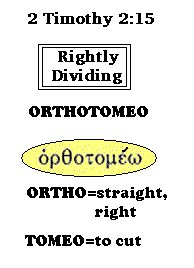Sir82 had written:
The Bible tells us that the judgment is solely based on whether one accepted Jesus Christ as his savior, "believe on him and ye shall be saved".
The first couple of respondents above have highlighted at least 2 areas where the judgment is based onsomething else, but did not specify what that "something else" is.
The post from sammieswife seems to indicate, as well, a judgment based on "something else".
What is this extra-Biblical "something else"? Or where do I find it in the Bible, if it is not "Believe on the lord Jesus and ye shall be saved"?
You had it right the first time, there is nothing else "required," you have it covered.... Please check out this article, glorious! http://withchrist.org/MJS/paul.htm . Here is a quote from it:
"If the great Luther, with his stirring message of justification by faith, had with Paul moved on from Romans 5 to Romans 6 with its amazing declarations concerning the now justified sinner's position of identification with his crucified, risen, and ascended Lord, would not a stifled, law-burdened Church be on higher ground today?" (F.J. Huegel, The Cross of Christ, p. 84).
The confusion people seem to be having is mixing up what Jesus said to Israel BEFORE his sacrificial death, and what He says LATER, after his ascension, to/through the Apostle Paul for the Gentile Church Age believers.
Rightly Dividing
the Word of Truth
| Study to show thyself approved unto God, a workman that needeth not to be ashamed, rightly dividing the word of truth (2 Timothy 2:15). |
"...rightly dividing the Word of Truth--the word "rightly dividing" literally means "to rightly cut, to cut straight."
[...]
That full article is here: http://www.middletownbiblechurch.org/dispen/rightlydi.htm
And going back to the first article I mentioned -- only because Miles Stanford writes more succinctly and clearly than I ever could -- here's a few more precious quotes that will remove a whole lotta confusion when one gets the sense of it:
"All Scripture is ... profitable for doctrine, for reproof, for correction, for instruction in righteousness" (2 Tim. 3:16) , but all Scripture is of primary application to a particular person or class of persons which the Bible designates as such. All Scripture is not for the angels, nor is it all for the Gentiles. In like manner, not all Scripture is addressed to the Jew, nor is it all addressed to the Christian (Dispensationalism, p. 417).
[...]
A Christian cannot pick up his Bible and read just anywhere and find direction for his feet. If he does not read discerningly, he may think it his duty to help rebuild a temple in Jerusalem today, or do any of thousands of things that would be totally inconsistent with his position as a Christian, whose life, commonwealth, and hopes are in heaven (Col. 3:1-3).
[...]
I hope everyone will at least check out this one article by Stanford... it is so lofty what Christ has bestowed upon the Grace Age believer, and Miles elicites the beauty of it all further down in the article, after clearing up the confusion between Israel and the Church... full article here:
PAULINE DISPENSATIONALISM
Miles J. Stanford

